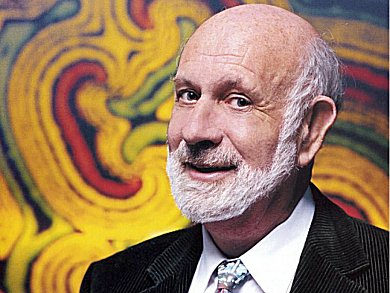To date, 118 chemical elements have been found. Professor Mario Markus, Max Planck Institute for Molecular Physiology, Dortmund, Germany, takes a look at each element, presenting a poem based on its natural properties along with a scientific overview of each element.
All 118 poems – as well as some poems about elements that only exist in theoretical simulations – are published in the book Chemical Poems: One On Each Element by Mario Markus. ChemViews magazine will publish a selection of these poems over the next months.
Phosphorus |
Phosphorus |
|
|
Non-metal. Density: 1.82 g/cm³. The name is derived from the Latin phosphoros, meaning “the bearer of light” and which was the former name of the planet Venus. It appears in four forms: white, which is toxic and spontaneously flammable, red, viloet, and black, the latter three forms being much less harmful than the white form. It was discovered in 1675 by Hennig Brand through the distillation of urine. As an alchemist Brand was impressed by its brilliance in the dark, and attributed the element to the “essence of life” (élan vital [1]). He was not entirely wrong about the importance of its biological role. In fact, in a person weighing seventy kg, one kg of phosphorus is present: it is part of the bones, the nervous system, the genetic material, and ATP (adenosine triphosphate). The latter is the “universal fuel” that exists in every cell of every organism, quickly and efficiently delivering energy for vital functions, such as movements, metabolism, and neuronal activity. It is used for the production of matches [1]. Phosporous polyphosphates are useful for washing, especially with hard water. Phosphoric acid is added to soft drinks to kill bacteria, prevent the reaction with oxygen and to provide a pleasant sour taste. Baking powders contain phosphates, together with sodium bicarbonate. Phosphine (phosphorus hydride) results from the decomposition of organic materials and is the cause of faint lights in swamps and waste water. Phosphorus has been one of the components of poisonous gases and bombs in many wars. Furthermore, this element is a component of Sarin, the so-called “atom bomb of the poor”, used by the Aum sect in the attack on the Tokyo subway in 1995 [1]. In appropriate amounts, phosphorus compounds are used as rat poisons. [1] J. Emsley, The 13th Element: The Sordid Tale of Murder, Fire, and Phosphorus, J. Wiley & Sons, Hoboken, USA, 2000. ISBN: 978-0471441496 |
Hold tight a match in your hand
|
Professor Mario Markus
Max Planck Institute for Molecular Physiology, Dortmund, Germany.
www.mariomarkus.com
Chemical Poems – One On Each Element,
Mario Markus,
Dos Madres Press 2013.
ISBN: 978-1-933675-98-5
Perfectbound, 308 pages, English, $30

Interview with Mario Markus: Poetry and Chemistry,
ChemViews magazine 2013.
DOI: 10.1002/chemv.201300010
The poems have also been published in German in:
- Chemische Gedichte,
Mario Markus,
Shaker Media, Herzogenrath, Germany, 2011.
ISBN: 978-3868587012
See all poems published so far by ChemistryViews.org.






If you are interested in reading more poems about the elements, then consider “From Arsenic to Zirconium: Poems & Surprising Facts about the Elements”, No Starch Press (2020):
https://nostarch.com/arsenic-zirconium